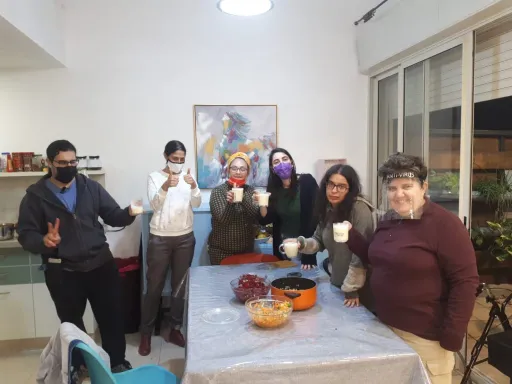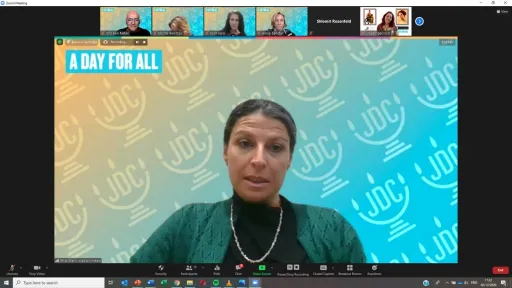Published in JDC on December 3, 2020. Read original article here.
The COVID-19 pandemic presents unique challenges for Israelis with disabilities, but JDC and Israel Unlimited are committed to bridging opportunity gaps.

The International Day of Persons with Disabilities, marked all over the world on Dec. 3, is devoted to promoting awareness and understanding of people with disabilities, and encouraging and advancing their well-being. It underscores the rights of people with disabilities to full participation in all aspects of life by guaranteeing their full equality.
The promise of inclusion of people with disabilities in society is not simply a matter of basic human justice: It is a vital prerequisite for progress and economic-social development. It is an investment in the future of each and every one of us and in society as a whole.
Therefore, as someone long active in the world of disabilities, I have mixed feelings about this annual event. People with disabilities, as the largest minority in the world, experience numerous challenges that are not always visible to, or understood by, the rest of society. While the Day of Persons with Disabilities allows us to focus on raising awareness and striving for affirmative action, the need for such a day also illustrates the depth and extent of the problem and the long road ahead to full participation of people with disabilities in society.
An estimated one billion people around the world experience some form of disability, whether physical, emotional, intellectual, or sensory. Some are visible and others are not, though they are no less real. Some 80 percent of people with disabilities live in developing nations and lack basic services and rights.
The challenges they face every day — which have been amplified over the past few months due to the global COVID-19 crisis — are not simply to keep healthy, but to continue being a part of their community and society and to keep functioning on a daily basis. Support systems, services, access, and community frameworks can help people with disabilities realize their dreams and live full lives.

A healthy life-style workshop held in Sderot by JDC and the Government of Israel for people with disabilities and following COVID-19 protocols.
We at Israel Unlimited — JDC’s partnership with the Government of Israel and the Ruderman Family Foundation — are 18 months into a process of studying the challenges independent living poses for people with disabilities and have concluded that we must bridge the current gaps in economic and social opportunities between people with and without disabilities. Accordingly, and following a comprehensive data review, we have identified large-scale initiatives that will lead to systemic change in three areas: economic resilience, sense of belonging, and autonomy.
The global coronavirus crisis has abruptly disrupted and upended life as we knew it. For people with disabilities, it was an even more dramatic disruption. At the best of times, even without a state of emergency, people with disabilities are on the margins of society — but the crisis deepened existing inequality and exposed the extent of their social and economic exclusion.
Here are just a few examples of COVID-19’s impact on Israelis with disabilities:
- A sense of loneliness: According to 2018’s ‘People with Disabilities: Facts and Figures’ by Israel Unlimited and Myers-JDC-Brookdale Institute, some 17 percent of people with disabilities routinely report loneliness. Some 60 percent of the participants in Israel Unlimited programs whom we surveyed reported a growing sense of loneliness since the crisis broke out and kept them isolated at home. Various other surveys indicate a similar trend.
- Digital literacy and access to information: 41 percent of people with disabilities do not use computers, and 26 percent do not use the internet. The main obstacles they face are cost (of hardware and service provision), lack of access, and lack of skills. Since digital literacy provides access to information and an entry ticket to social and economic participation, its absence exacerbates these gaps.
- Students with disabilities: The forced social distancing and long-distance learning have had a significant impact, widening gaps in terms of ability to function that have broader repercussions beyond the school system (on family life, health, and welfare).
- Leisure activities – While social networks and websites offer many suggestions, the difference in levels of functioning and in needs impedes the ability to provide a tailored response.
- Employment: A Myer-JDC-Brookdale Institute research done for the Ministry of Justice showed a steep decline has been recorded in the employment of people with disabilities. Some 41 percent were not employed as of February, increasing to a rate of 62 percent unemployed in October and raising grave concern that they will be the last to return to the workforce. Barring significant change, this setback could severely undermine the achievements made in recent years in the employment of people with disabilities.?
Still, along with the negative implications, the coronavirus pandemic has generated quite a few opportunities. Thanks to the support of JDC and its Executive Board, as well as courageous and determined work with people with disabilities, their families, government partners, foundations, civil society organizations, and the business sector, we have mapped these opportunities and the resulting key investments required to create the greatest impact on the lives of people with disabilities given current circumstances.
Here are a few of our findings:
- Personalized services – Providing a personal, flexible response tailored to the wishes and needs of the disabled person proved extremely effective prior to the pandemic, even more so during the crisis, and will assuredly continue to be so once life returns to normal. To that end, systemic change is required that includes building inter- and intra-ministerial infrastructure, adapting services’ budgeting, advancing support for individual decision making and adapting personalized programs to each person with disabilities to facilitate greater autonomy and enable social inclusion.
- Independent living in the community – A recent study of group homes in New York City estimated that residents are around five times more likely than the general population to develop COVID-19. Action is required to accelerate progress on independent living in the community that would allow people with disabilities to realize their right to choose their preferred lifestyle while ensuring their security.
- Community and belonging – Loneliness is one of the biggest determinants of the community integration of people with disabilities. Infrastructure allowing people with disabilities to create for themselves informal circles of belonging and thereby expand their social participation beyond formal institutional frameworks must be advanced.
- Technology – These challenging times are accelerating the development of accessible, personally adapted solutions brought to clients’ homes, and we are witnessing an impressive leap in communications ability between individuals, groups, and a variety of online interfaces. With the development of digital platforms, new practices are taking shape in the work with people with disabilities, in guiding them, treating them, providing services, and more. This has opened a new window for people with disabilities into the effective utilization and realization of their rights and aspirations for self-improvement, the creation of human and financial capital, and the expansion of the choices they have. We must ensure these platforms are made accessible and available to every person with disabilities.?

Efrat Stern participates in a virtual JDC celebration of the International Day of Persons with Disabilities.
I have had the honor of being part of Israel Unlimited for nine years, during which I advanced significant processes on a variety of issues — such as independent living, the hospitalization-community continuum, and responses for people with multiple disabilities — and witnessed the growing understanding of the rights of people with disabilities to belong to their community.
I started my job as director of Israel Unlimited at the outset of the first lockdown in March 2020, and unfortunately, I have also come to realize that despite much progress, people with disabilities have once again disappeared from the public discourse during the COVID-19 crisis. On the few occasions they were invited to appear publicly, the discussion was more about them than with them, and it was overlaid by stigmas regarding the value of human life.
We have a long road ahead of us as we seek to change attitudes and eliminate discrimination. People with disabilities are everywhere around us — in all age groups and walks of life — and we must ensure that any activity or intervention includes them, in accordance with their needs and challenges. We must examine how we can harvest the potential that lies in the shared uncertainty and difficulty forced on all of us. We have a unique opportunity to leverage this crisis in order to shape a more inclusive and accessible society.
Efrat Stern has extensive experience in leading inter-sectoral partnerships, promoting policy, and developing effective solutions for the challenges facing people with disabilities. Efrat has been part of Israel Unlimited’s management team since 2016, leading strategic planning processes and managing staff and programs promoting person-centered services and independent housing solutions for people with disabilities.
She holds a B.A. in Sociology and Political Science from Tel Aviv University and a master’s degree from the Schwartz Nonprofit Management program at the Hebrew University.